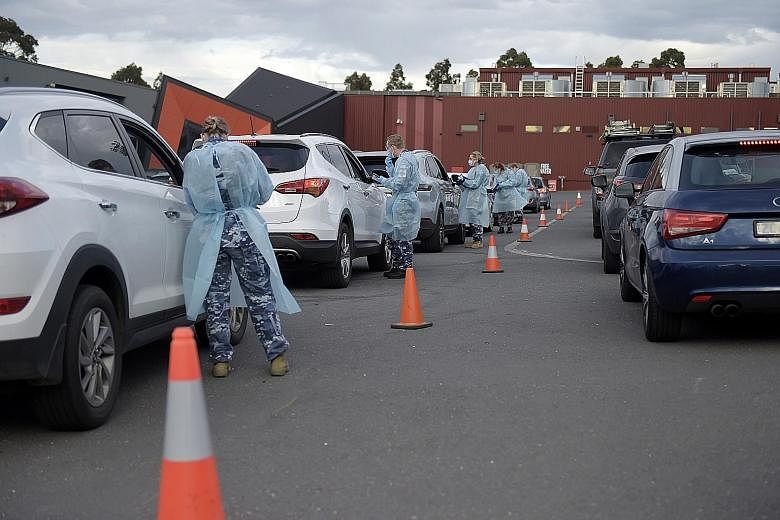SYDNEY • The authorities have ordered the lockdown of 36 suburbs in Australia's second-biggest city Melbourne in a bid to stop a spike in coronavirus cases, a dramatic departure from the relaxation of restrictions elsewhere in the country.
From midnight today, the first suburb-specific stay-home order will be imposed on some 320,000 people, Victoria's state premier Daniel Andrews told a news conference yesterday.
Residents in the suburbs must stay home unless travelling for work, school, healthcare, exercise or food for a period of four weeks.
Cafes and restaurants would need to revert to takeaway only, just weeks after they returned to seated diners, amid a wider reopening of the national economy.
The government in Victoria, of which Melbourne is the capital, also requested all flights be diverted to other states to prevent the risk of imported cases.
"If we don't take these steps now we will finish up in a situation (where rather) than locking down 10 postcodes, we will be locking down every postcode," said Mr Andrews, referring to postal codes which cover the 36 suburbs.
"People are desperate for this to be over, no one more than me, but it isn't and pretending won't get us to the other side."
The return to lockdown is a devastating setback for the home state of nearly a quarter of Australia's 25 million people, widely seen to have taken one of the toughest enforcement approaches when the country first went into lockdown in March.
But while most other states have reported zero or low single-digit daily increases in Covid-19 infections for weeks, Victoria has experienced double-digit increases for each of the previous 14 days, taking the national total to its highest number of new cases since April.
In the 24 hours to yesterday, Victoria reported 64 new cases, down from the previous day's 75 new cases. By comparison, the most populous state, neighbouring New South Wales (NSW), and the third-most populous, Queensland, both reported no new cases.
The country has had 104 deaths from about 7,800 infections.
The Victorian government is getting help from defence personnel and healthcare workers sent from interstate, with teams door-knocking in affected neighbourhoods to ask people to undertake tests for the illness, Mr Andrews said.
Police in the lockdown suburbs will fine people who break the rules, he said.
"We've been through this before and we now have to go through it again," Mr Lambros Tapinos, the mayor of several affected postcodes, told Reuters by telephone.
"It will have a devastating impact on people and particularly local businesses, but we have to do it."
The reversal is at odds with moves taken by neighbouring South Australia and the northern state of Queensland which both unveiled plans to reopen internal borders to the rest of the country except Victoria, citing its infection numbers.
Queensland said it would reopen its border to the rest of the country from July 10 while keeping out arrivals from Victoria. Queensland does not share a border with Victoria but would make people entering from other states sign a declaration that they had not been to Victoria for 14 days, with a A$4,000 (S$3,800) fine if they are found to have lied.
NSW, which borders Victoria, said it would continue to keep its border open as it focused on supporting its economy amid the pandemic.
REUTERS











